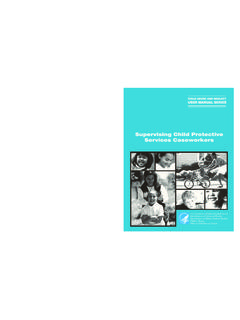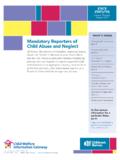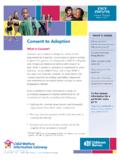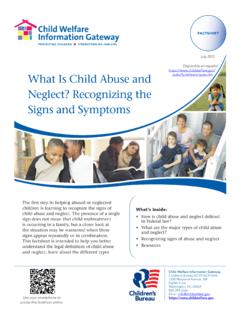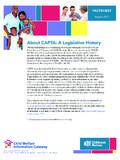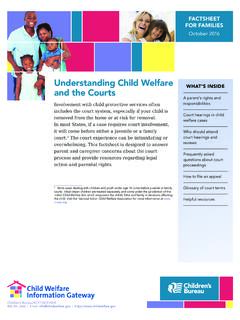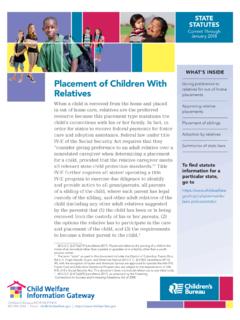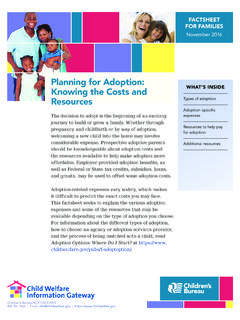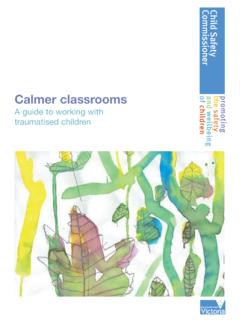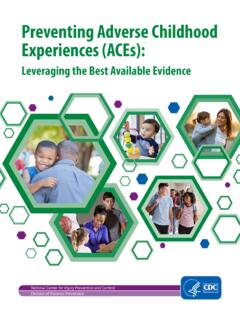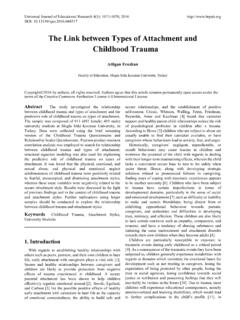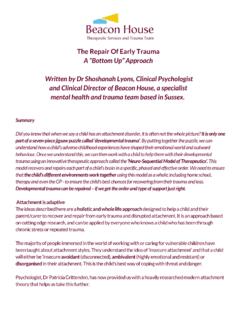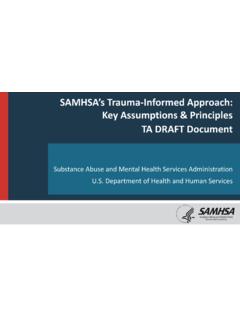Transcription of Parenting a Child Who Has Experienced Trauma
1 Children s Bureau/ACYF/ | Email: | FOR FAMILIESN ovember 2014 WHAT S INSIDEWhat is Trauma ?The impact of untreated traumaUnderstanding your Child s behaviorHelping your childConclusionResources Parenting a Child Who Has Experienced TraumaChildren who have Experienced traumatic events need to feel safe and loved. All parents want to provide this kind of nurturing home for their children. However, when parents do not have an understanding of the effects of Trauma , they may misinterpret their Child s behavior and end up feeling frustrated or resentful. Their attempts to address troubling behavior may be ineffective or, in some cases, even harmful.
2 This factsheet discusses the nature of Trauma , its effects on children and youth, and ways to help your Child . By increasing your understanding of Trauma , you can help support your Child s healing, your relationship with him or her, and your family as a 2o201r4h2t1p2so:2 material may be freely reproduced and distributed. However, when doing so, please credit Child Welfare Information Gateway. Available online at Is Trauma ? Trauma is an emotional response to an intense event that threatens or causes harm. The harm can be physical or emotional, real or perceived, and it can threaten the Child or someone close to him or her.
3 Trauma can be the result of a single event, or it can result from exposure to multiple events over traumatic events may include: Abuse (physical, sexual, or emotional) Neglect Effects of poverty (such as homelessness or not having enough to eat) Being separated from loved ones Bullying Witnessing harm to a loved one or pet ( , domestic or community violence) Natural disasters or accidents Unpredictable parental behavior due to addiction or mental illnessFor many children, being in the Child welfare system becomes another traumatic event. This is true of the Child s first separation from his or her home and family, as well as any additional Impact of Untreated TraumaChildren are resilient.
4 Some stress in their lives ( , leaving caregivers for a day at school, riding a bike for the first time, feeling nervous before a game or performance) helps their brains to grow and new skills to develop. However, by definition, Trauma occurs when a stressful experience (such as being abused, neglected, or bullied) overwhelms the Child s natural ability to cope. These events cause a fight, flight, or freeze response, resulting in changes in the body such as faster heart rate and higher blood pressure as well as changes in how the brain perceives and responds to the world. In many cases, a Child s body and brain recover quickly from a potentially traumatic experience with no lasting harm.
5 However, for other children, Trauma interferes with normal development and can have long-lasting effects. Table 1. Effects of Trauma on ChildrenTrauma may affect children s ..In the following ways Bodies Inability to control physicalresponses to stress Chronic illness, even intoadulthood (heart disease,obesity)Brains (thinking) Difficulty thinking, learning, andconcentrating Impaired memory Difficulty switching from onethought or activity to anotherEmotions (feeling) Low self-esteem Feeling unsafe Inability to regulate emotions Difficulty forming attachmentsto caregivers Trouble with friendships Trust issues Depression, anxietyBehavior Lack of impulse control Fighting, aggression, runningaway Substance abuse SuicideFactors that determine the impact of traumatic events include the following: Age.
6 Younger children are more vulnerable. Even infants and toddlers who are too young to talk about what happened retain lasting sense memories of traumatic events that can affect their well-being into adulthood. Frequency. Experiencing the same type of traumatic event multiple times, or multiple types of traumatic events, is more harmful than a single event. Relationships. Children with positive relationships with healthy caregivers are more likely to recover. Coping skills. Intelligence, physical health, and self-esteem help children 2o201r4h2t1p2so:2 Perception. How much danger the Child thinks he or she is in, or the amount of fear the Child feels at the time, is a significant factor.
7 Sensitivity. Every Child is different some are naturally more sensitive than effects of Trauma vary depending on the Child and type of traumatic events Experienced . Table 1 shows some of the ways that Trauma can affect list of potential consequences shows why it is so important for parents to understand Trauma . The right kind of help can reduce or even eliminate many of these negative Your Child s BehaviorWhen children have Experienced Trauma , particularly multiple traumatic events over an extended period of time, their bodies, brains, and nervous systems adapt in an effort to protect them. This might result in behaviors such as increased aggression, distrusting or disobeying adults, or even dissociation (feeling disconnected from reality).
8 When children are in danger, these behaviors may be important for their survival. However, once children are moved to a safer environment, their brains and bodies may not recognize that the danger has passed. These protective behaviors, or habits, have grown strong from frequent use (just as a muscle that is used regularly grows bigger and stronger). It takes time and retraining to help those survival muscles learn that they are not needed in their new situation (your home), and that they can relax. It might be helpful to remember that your Child s troublesome behavior may be a learned response to stress it may even be what kept your Child alive in a very unsafe situation.
9 It will take time and patience for your Child s body and brain to learn to respond in ways that are more appropriate for his or her current, safe a traumatized Child may require a shift from seeing a bad kid to seeing a kid who has had bad things TriggersWhen your Child is behaving in a way that is unexpected and seems irrational or extreme, he or she may be experiencing a Trauma trigger. A trigger is some aspect of a traumatic event that occurs in a completely different situation but reminds the Child of the original event. Examples may be sounds, smells, feelings, places, postures, tones of voice, or even who have Experienced traumatic events may reenact past patterns when they feel unsafe or encounter a trigger.
10 Depending on whether the Child has a fight, flight, or freeze response, the Child may appear to be throwing a tantrum, willfully not listening, or defying you. However, responses to triggers are best thought of as reflexes they are not deliberate or planned. When children s bodies and brains are overwhelmed by a traumatic memory, they are not able to consider the consequences of their behavior or its effect on by AgeTable 2 shows symptoms and behaviors that children who have Experienced Trauma might exhibit at different stages of development. The age ranges are merely guidelines. For many children who have Experienced Trauma , their development lags behind their age in calendar years.
